- About
- Membership
- Resources
- Awards
- Events
- Get Involved

We congratulate the 2022 NABT Teaching Award Recipients and are honored to recognize their achievements.
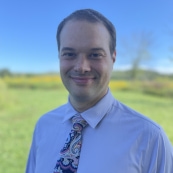
Festus High School, Festus, MO
I grew up on a farm on the Gasconade river in Missouri. As a kid, I spent a lot of my time exploring the woods or pouring through my mother’s old nursing textbooks and biology has held my fascination ever since. I earned Bachelor’s degrees in Biology and Biology education from Missouri State University in 2012, and a Master’s Degree in Entomology from the University of Illinois at Urbana-Champaign in 2015. I taught for two years at the Collegiate School of Medicine and Bioscience in St. Louis, then for the past five years at Festus High School in Festus, Missouri. My teaching work at Festus has included biology, ecology, dual-credit biology, and anatomy and physiology.
As a new teacher, I had the honor of receiving a Knowles Teaching Fellowship, which showed me the incredible power of being part of a close-knit and passionate community of educators. It was also through Knowles’ support that I first attended an NABT meeting in 2016, an annual pilgrimage that I have continued ever since. During the fall of 2020, I began part-time work as an instructional coach outside of my district, and I have continued to expand my interest and work in this area.
In January 2021, I began working toward my EdD in Teacher Leadership at Maryville University in St. Louis which has allowed me to expand my knowledge of and engagement in my district and the education community more broadly, while remaining firmly rooted in my classroom.
Personel Statement:
I have always experienced a great deal of satisfaction and joy from learning, particularly learning about the biological world. The idea of continuing this joy indefinitely and of sharing it with others, is what first led me to the idea of teaching science. As I have grown and gained experience, I continue to take a lot of joy from my content area, but have come to see teaching as a calling that includes other considerations. I feel strongly that I work to prepare students to be active participants in our democracy, which requires science literacy, yes, but also collaboration skills, the ability to learn independently, and a strong set of personal morals and values. My work in my classroom, my school, and the education community all focuses on that paradigm of teaching.
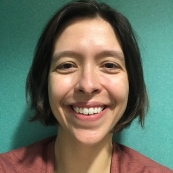
Bloomington High School South, Bloomington, IN
Kirstin creates innovative, collaborative, science- and justice-oriented learning experiences for children and adults. She is a National Board Certified Teacher, a Presidential Awardee for Excellence in Math and Science Teaching, and a Senior Fellow at the Knowles Teacher Initiative, where she has served as an editor-in-chief of the journal Kaleidoscope: Educator Voices and Perspectives.
A graduate of Stanford University’s Schools of Medicine (PhD) and Education (MA), Kirstin generates wisdom and co-designs curriculum with high schoolers in Bloomington, Indiana and collaborates with educators across the country on efforts to engineer world-changing learning opportunities for students and teachers. Kirstin is also a visual, sculpture, and performance artist whose work connects us to animals, nature, and each other.
Personal Statement:
At the end of his life, Bob Paine spoke on why he and his colleagues were able to uncover the important concept of keystone species: “What made this group so special is that each of us has a pretty private part of the world, some large, some small, which we understand and love.”
I want my biology and Earth and space science students to begin to understand – and yes, love – the world around us. I want them to see their own private parts of our world as connected to bigger systems and as changing over time in ways only scientists - both professional scientists and community scientists alike - might notice. But most importantly, I want them to feel the agency we each hold in saving our planet, as well as the power of using science to exercise that agency collectively.
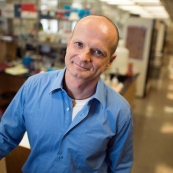
Indiana University Bloomington, Bloomington, IN
Armin Moczek is a Professor in the Department of Biology, with joint appointments in Cognitive Sciences and the Program of Neuroscience. He is an evolutionary developmental biologist broadly interested in understanding why and how developmental evolution has unfolded the way it has, why novel complex traits originated when they did, and the future of developmental evolution on a rapidly changing planet. He is the Co-Director of the James Holland Summer Science Programs, heads a K12 Science Outreach Initiative for General and Special Education in collaboration with Wonderlab Museum, and serves on the Board of Directors of AFRISNET, a not-for-profit organization aimed to increase access of African students to US graduate programs. He also serves on his department’s Diversity & Inclusion Committee. Armin is a fellow of the American Association for the Advancement of Science, the John Simon Guggenheim Foundation, and holds the 2017 Fulbright Distinguished Chair for Science, Technology, and Innovation.
Personal Statement:
I lived the first half of my life in Germany, the second in the US. I started out on a non-immigrant visa, but am now a dual citizen. I come from a thoroughly working class family and neither of my parents have graduated from High School. And I derive from a family uprooted, separated, and resettled in the rise and fall of the iron curtain in central Europe. All of this has instilled in me a solid recognition that the opportunity to access and benefit from education is highly unevenly distributed, and that talent and hard work by themselves are far from enough to succeed in academia and beyond. Over the past 18 years as a faculty member of Indiana University's Department of Biology I have therefore sought to develop initiatives that create opportunities and contribute to leveling access to resources in ways that serve my local and regional community, leveraging pre-existing efforts where I find them, but also creating novel support structures where I find them lacking. Over the years this approach has given rise to three separate but complementary initiates: (i) the James Holland Programs for students from demographics underrepresented in STEM; (ii) Afrisnet, a non-profit organization whose goal is to enhance the access of African students to US graduate programs, and (iii) the Moczek-Lab Science Outreach Initiative aimed at integrating the teaching and learning of evolutionary biology. For the purposes of this statement I will focus on this third initiative below.
INTEGRATING THE TEACHING & LEARNING OF EVOLUTION IN SOUTH-CENTRAL INDIANA AND BEYOND
Since 2005 I have partnered with regional school districts and WonderLab, a local children’s museum for science, health, and technology, to develop and disseminate science modules that support and enhance Indiana Science Standards broadly, and those focused on Evolution in particular. I have developed diverse modules now broadly utilized in area schools, taught 20 teacher-training workshops to date with >400 participating teachers to disseminate module content, raised funds to make module content, supplies, workshop participation etc., free for teachers, and frequently visit individual classrooms to model module implementation for teachers new to them [28-45 class visits per year since 2014].
Some of these efforts are now gaining recognition beyond my home area. For example, one recently developed and especially sought after module titled Reconstructing 6 Million years of human evolution using diverse data sets was invited for a workshop presentation (co-led by Dr. Kirstin Milks and myself) at the annual conference of the American Association of Biology Teachers in Chicago in 2019. Since then it has been selected by the National Center for Science Education (NCSE) for inclusion in its Evolution curriculum, and in collaboration with NCSE and Dr. Milks I have begun to train the first generation of teachers to begin disseminating this module nationwide. This module puts offers to students 6 different data sets, from high quality reproductions of homid skulls to artefacts and climate data, to assemble an increasingly nuanced understanding of past 6 Millions years of human evolution - when, where, in what order and under what circumstances key traits that define us as a species today first originated. But just as important is that students learn how this knowldge is acquired, how to make inferences about the past, the limits of our current knowledge, and how scientists deal with uncertainty. Additionally, the module introduces students to the notion that many "uniquely human" traits also existed outside our own lineage, that social and other biases can influence how scientists and others interpret discoveries, and how the field of human evolution constantly revises itself as new discoveries are made every year.
In all of these efforts I emphasize both the teaching of students and the creation of a supportive resource environment for teachers and other educators. For example, a second successful module titled The evolutionary morphology of skulls and teeth, is now routinely used across several school districts thanks in large part to the teacher training workshops I was able to teach though WonderLab. Yet in order to maximize module implementation across as many schools as possible, I also trained WonderLab staff, enabling staff members to lead module presentations themselves, either in area schools or by hosting teachers and their students at the museum. To further lessen potential barriers to the success of this effort I raised funds to cover admission fees and transportation. Similarly I have taken this module - and often trained staff on site - to make it accessible to local retirement centers, at the annual Bloomington Science Fest, and diverse Science Fair events.
Throughout I also make an effort to reach out to diverse schools and student populations. For example, I routinely visit schools outside the city (e.g. Bedford, Oolitic, Spencer) to reach out to rural student populations and to help me become aware of the diversity of teaching needs and challenges in my greater community. I have also formed partnerships with teachers to make module content accessible to neurodiverse students and English Language Learners. Lastly, I have used these same efforts to systematically expose my own graduate students and postdoctoral researchers to science outreach in Evolutionary Biology, encouraged their participation in teacher training workshops, and facilitated the development of individualized outreach contributions. To date 8 postdocs and 6 graduates students to have graduated from my group have initiated their own outreach efforts at their respective tenure institutions modeled after their experiences with me. It is my hope that collectively these efforts help improve and transform, in a lasting manner, the teaching and learning of evolutionary biology in my community and beyond.
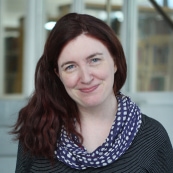
Texas A&M San Antonio, San Antonio, TX
Davida Smyth is an Associate Professor of Biology in the Department of Life Sciences at Texas A&M University-San Antonio, Texas. She received her Ph.D. in Microbiology from the University of Dublin, Trinity College, Ireland, and completed her postdoctoral training at New York Medical College, the University of Mississippi Medical Center, and New York University. She has served as Associate Professor of Natural Sciences at Eugene Lang College of Liberal Arts at The New School, Associate Professor and Chairperson of the Department of Natural Sciences in Mercy College, and Assistant Professor of Biology at New York City College of Technology (NYCCT). She researches antibiotic resistance, viral and bacterial aerosol transmission, and the use of wastewater epidemiology and surveillance for pathogens such as SARS-CoV-2 and works to improve civic and scientific literacy in biology by using ePortfolios and integrating authentic research into the curriculum. Since 2014, she has been involved with SENCER (Science Education for New Civic Engagements and Responsibilities). She was awarded the Mercy College Excellence in Teaching Award in 2018. In 2019 she became a PULSE Fellow and later a PULSE Ambassador. In 2020, she was appointed Deputy Director of the National Center for Science and Civic Engagement and in 2021 she was awarded the Faculty Excellence in Advising award from Eugene Lang College of Liberal Arts at The New School. Currently, she is co-PI on the NSF RCN-UBE Research Experiences in Microbiomes Network and the NSF IUSE Vision and Change in Undergraduate General Education Biology Courses.
I strive to give students what they need to be successful, 21st-century citizens and scientists. I endeavor to be as inclusive as I can, leveraging the diversity of my students when I teach, often starting class with an analogy of how I adapted to living in the US just as bacteria adapt to the environment. I focus on engaging with the students, ensuring that I have their attention, that I can get to know them, what is driving them, and what their interests are. I love to use humor and bring joy into my classroom. I use project-based learning (PBL) and ePortfolios to connect with real-world issues and to improve student civic scientific literacy. In an assignment called “Getting Friendly with Bacteria,” students use ePortfolios to feature the characteristics of a chosen microbe. My freshmen reflect on issues of social justice in my course “How the Toilet Changed the World”. Through these experiences, students understand that science can hold the answer to solving global challenges and that the students themselves can help, especially if they work together and “science” the problem! Whilst, engaging in exciting research can satisfy many scientists, for me, knowing that I have infected some new minds with my enthusiasm for microbiology is massively rewarding. As the first member of my family to earn a Ph.D., whose parents did not attend university, I am acutely aware that any student, no matter what their background or learning ability, has the potential to develop and mature as tomorrow’s scientist.
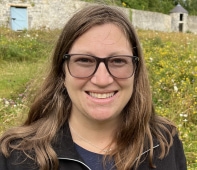
Texas State University, San Marcos, TX
Dr. Kristy Daniel, Associate Professor at Texas State University as Hispanic-Serving Institution, received her Ph.D. from the University of Missouri in Curriculum and Instruction–Science Education and her M.S. in Ecology and Evolutionary Biology from Iowa State University. Her diverse background is reflected in the courses she teaches which include Communicating Science, Introductory Biology, and Plant Taxonomy. She also runs a summer Ireland education abroad program, focusing on Irish biodiversity and conservation while offering students field biology experience. Dr. Daniel leads a productive research program specializing in Biology Education Research. Specifically, she studies why what scientists say is not always what learners understand. She identifies areas of cognitive conflict, specifically with socioscientific issues, that create gaps in understanding. Then she investigates methods to bridge communication to improve learning, motivate engagement, and broaden participation in science. Her initial research explored college student tree-thinking (interpreting, comparing, and generating phylogenetic tree diagrams), and created instructional interventions aimed at overcoming initial tree-thinking challenges. Her research has been used to support changes to curricula, including how phylogenetic trees are taught in university biology courses. This work led to her development of a new theoretical framework, representational competence, that directs investigations about how learners come to understand, communicate, and generate knowledge using visual models of science. Dr. Daniel also explores learning beyond college classrooms, in informal environments. She led an NSF-funded team that created a model for preparing college student volunteer science interpreters and investigated the role of using technology to enhance outdoor learning. This research has led to advances in motivation techniques and how we approach broadening participation in science.
I believe it is my job as an educator to progressively make myself unnecessary to a student and foster mastery goal-driven learning. This means that I support the use of student-centered, active learning along with scaffolded practices to facilitate students becoming independent, life-long learners. This approach is more authentic to how science is actually done in the professional community, also highlighted by the NSF/AAAS Vision and Change goals. I constantly use pre-assessments (such as conceptual cartoons, discussions, and pretests), in which students are forced to take ownership of their ideas, and I design instruction to challenge identified alternative conceptions before building upon a shared knowledge foundation. I also push students to get involved in science activities outside of the classroom to help normalize biology in everyday life and broaden participation in science through relevancy.
Toms River Regional School District, Toms River, NJ
Christine Girtain has a bachelor’s degree in biology with a concentration in education from The College of New Jersey & a master's in Earth Science Instruction & Curriculum from Kean University. She student taught in Lancaster England & at Trenton Central High School. She has been teaching science for 28 years including Earth Science, Biology & Authentic Science Research. Christine has been recognized twice as her school’s Teacher of the Year. She is the New Jersey STEM Pathways 2019 STEM Teacher of the Year & a 2021 New Jersey state finalist for the Presidential Awards for Excellence in Mathematics & Science Teaching. Partnering with the Army & Navy, Christine is building an equitable K-12 STEM Pipeline to help students find their STEM identities. Her research students develop their own educational plans. She has taken students to do research in Costa Rica & on educational tours in Europe. Christine is a national presenter & advocate for increasing agricultural literacy working with Nourish the Future, the National Corn Growers Association, the United Soybean Board, the Beef Checkoff & The American Farm Bureau Foundation for Agriculture.
Learn It, Love It, Make It Your Friend! My goal is to expose teachers and students to innovative STEM learning opportunities as well as national & international partnerships. I want to light the spark that fuels the passion for a lifetime of learning.
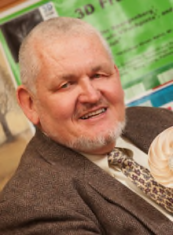
University of Delaware, Newark, DE
At the University of Delaware, John R. Jungck is a Professor of Biological Sciences and Mathematical Sciences, the Inaugural Fellow of the Honors College, and Associate Director of the Institute for Transforming University Education. He is a former Editor of the American Biology Teacher, Biology International, and Bioscene: Journal of College Biology Teaching. He also served as NABT’s representative to AAAS. John is best known as a founder of the BioQUEST Curriculum Consortium (http://bioquest.org; https://QUBEShub.org), He has edited four special issues of journals on Mathematical Biology education: Bulletin of Mathematical Biology, Mathematical Modelling of Natural Phenomena, cbeLife Science Education, and Briefings in Bioinformatics. He serves on the Editorial Boards of several journals including the Bulletin of Mathematical Biology, Evolutionary Bioinformatics, and the American Journal of Undergraduate Research. His honors include a D.Sc. honoris causa from the University of Minnesota, a Fellow of AAAS, ACUBE, AIBS, and SICB, a Fulbright Scholar in Thailand, and a recipient of the Bruce Alberts Award from the American Society for Cell Biology and the T. H. Huxley Award from the Society for the Study of Evolution. His former service includes: Vice President of the International Union of Biological Sciences, President of the IUBS Commission on Biology Education, and Chairperson of the U. S. National Academy of Science’s National Committee of IUBS. He is deeply committed to interdisciplinary STEAM education, Citizen Science, and social justice education. His research interests include scientific visualization, the applications of graph theory to biology, genetic codes as codes, image analysis of patterns in nature, evolutionary analysis of complex data sets, and collaboration with artists.
My aspiration as a biology educator have been to try to create a community devoted to making biology education more open and accessible so as to be more inclusive, collaborative, and supportive. As an evolutionary biologist and genetics educator, I believe that mathematics is a civil right that empowers students to become better citizens in a participatory democracy and socially responsible.
Supported by NABT Member Donations

biography
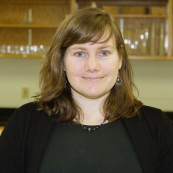
Woodstock Academy, Woodstock, CT
Valerie received her undergraduate degree in biology from Eastern University in St. Davids, Pennsylvania, and a Master of Education from the University of Massachusetts Amherst. She began her teaching career twenty-six years ago at Walpole High School and spent the last 24 teaching at The Woodstock Academy in Woodstock, CT. The Woodstock Academy is an independent school in rural Connecticut that serves students from six small public school districts as well as boarding students from every corner of the globe. Valerie teaches various courses, including college prep Biology and AP Biology, and dual enrollment courses through the University of Connecticut in Biotechnology and Environmental Science. In addition to teaching, she is the advisor of the Woodstock Academy Medical Club and Science National Honor Society and serves on the Board of Trustees Academic Committee. In 2012, Valerie was a member of the NABT/BSCS AP Biology Teacher Academy. This pivotal opportunity started a parallel career in providing professional development experiences to fellow biology educators. Valerie has served as HHMI BioInteractive Ambassador since 2014. She has worked with teachers across the country through school partnership workshops, national science teachers’ conferences (NSTA & NABT), and online workshops provided by BioInteractive. It is an honor to be this year’s recipient of the Kim Foglia AP Biology Service Award. Kim Foglia selflessly shared her resources and had a strong influence on how I shaped my approach to teaching AP Biology. As for many others, she was a lifeline as I navigated the complexities of the course.
While my primary goal as a biology teacher is to guide my students to better understand the natural world, my ultimate goal is to prepare students for the world they will encounter outside my classroom and the challenges that will inevitably come their way. When facilitating professional development workshops for other biology teachers across the country or contributing to online communities of AP Biology teachers, I try to focus on building other teachers’ confidence to take on the work in a way that benefits students.
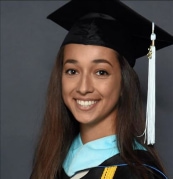
Glenbrook South High School, Park Ridge, IL
I graduated from North Park University with a bachelor's in Secondary Education and Biology. I started my teaching career as a part-time Biology and Chemistry teacher and Aide at Glenbrook South High School. After 2 years in district 225, I moved to Wheeling High School where I have been teaching for the last 3 school years in Freshman Biology, Honors Biology, and 10-12 Physical Science. I returned to North Park and this past spring, and graduated with my Masters in Education in Language, Literacy, and Culture in order to play more of a role in EL and Bilingual Science Education.
My journey in Biology education resonates with a strong desire to stimulate students and leave them with a long lasting understanding of Biology, Life Science, and Science-centered skills which could be carried with them beyond the classroom. This also means striving to create an environment where all students experience belonging, acceptance, and success in science. In my practice I am constantly seeking opportunities to involve students in the class room and in the process of their own learning through language, experience, and teamwork. When students come to Biology, the possibilities are endless. We become zoo keepers, geneticists, and marine biologists; while also embracing that we are diverse learners, multilingual peoples, artists, writers, athletes and mathematicians. My goal is for my students to leave the classroom as more educated students, but also as more experienced individuals. Individuals who know that they belong: in zoology, epidemiology, and physiology... because they first felt that they belonged in Freshman Biology.
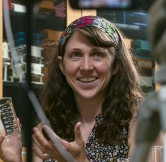
Durham Technical Community College, Durham, NC
Jayme Dyer has been teaching Introductory Biology as an Adjunct Instructor at Durham Technical Community College in Durham, NC since 2018. Before that, she taught Introductory and Upper-level Biology courses as a teacher for the Duke high school Talent Identification Program, as an Adjunct Instructor at Lesley University, and as a Visiting Assistant Professor at Earlham College. Jayme earned her BA in Biology from Carleton College, her PhD in Genetics at Duke University, and she was a Postdoctoral Fellow in Biology at MIT. In addition to her passion for teaching, Jayme is an avid freelance science communicator. She runs a Biology education YouTube channel (https://youtube.com/YouTooBio) and she has taught community college students how to produce science education videos. She also works one-on-one with research scientists to improve their science communication skills, she works with NSF-funded research teams to develop Broader Impacts curricular materials, and she reviews video storyboards and provides voice-over talent for textbook-associated animations. Jayme is a first-generation college student who firmly believes that anyone can become a scientist. Improving equity and access for students in STEM and academia is one of Jayme’s central values, which is why she employs evidence-based strategies in her classes to engage, include, and promote learning for diverse students.
I use real data to teach foundational concepts in biology.
I bring real data into the classroom - especially the Introductory Biology classroom – because I believe it is critical that students learn content and scientific reasoning skills concomitantly.
For example, when I teach evolution I use a freely-available data-centered narrative about Salvador Luria and Max Delbrück’s landmark 1943 experiment. Student groups respond to discussion prompts that ask them to analyze data and determine which of two hypotheses is supported by the data, then we discuss the results as a class together. Later, in lab, students replicate the Luria-Delbrück experiment using the freely-available browser-based evolution software, Avida-ED (1, 2). During the lab, students determine how many “generations” it takes for a beneficial mutation to arise in a population of self-replicating, mutating computer scripts under selective or non-selective conditions. Students analyze data collected by the entire class to determine that mutations arise randomly, consistent with the Luria-Delbrück experiment. Together, these exercises reinforce the foundational concept that mutations occur randomly and not in response to selective pressure (a common misconception), while students concomitantly develop analytical and quantitative reasoning skills through data analysis in both lecture and lab.
Because I believe in the importance of incorporating real data throughout the introductory biology curriculum, I wanted to assign instructional homework videos that use data-centered narratives. However, I found very few instructional videos that incorporate real data. Thus, to produce the videos I wanted to assign, in 2020 I created the YouTube channel YouTooBio. I produce videos that introduce common laboratory equipment and techniques, and foundational concepts in biology, using data-centered narratives. For example, in How do you read Evolutionary Trees? I use a compelling story about the first time an evolutionary tree was used in a criminal court. While I assign this video to students in my classroom, the video has tens of thousands of views on YouTube, which means many students beyond my own class have learned introductory-level content in the context of compelling data-centered narratives.
Once I had developed the skills to produce science videos, I wanted to teach students how to do it, too. In 2021, I received a Mini-Grant from the Durham Tech Foundation to lead a 10-week summer program that taught five Durham Tech students how to produce science videos. I designed the program with three stakeholders in mind: 1) The students enrolled in the program learned fundamental skills in science communication and video production; 2) Durham Tech Science Faculty had their pedagogical needs directly met, since they determined the video topics; and 3) Future Durham Tech students will benefit from the empowering experience of seeing students just like them explaining science concepts. You can see the students’ videos here; I am exceptionally proud of what they produced! And since the students’ videos incorporate compelling data-centered narratives, future Durham Tech students will also learn introductory-level content in the context of real scientific data.
I center Diversity, Equity, and Inclusion in my pedagogical choices.
As a first-generation college student, I know what it feels like to be an academic outsider. I make pedagogical decisions that have been shown to reduce the achievement gap and invite all types of learners to achieve success and feel welcome in the classroom.
I design my courses around principles of active learning and high structure, which have both been shown to disproportionately improve classroom performance for students traditionally excluded from STEM (3, 4). Students in my classroom build their knowledge through hands-on activities, drawing and writing exercises, small-group discussions, and repeated retrieval through no- and low-stakes assessments. I also design my courses to have high structure, including regularly-spaced low-stakes homework assignments.
I believe in choosing course topics that can impact student attitudes and beliefs, especially related to race. When students learn about genetic variation within and between racial groups, they demonstrate fewer cognitive forms of prejudice (5). For this reason, I explicitly teach about genetic variation within the human lineage, coupled with a discussion of the historical basis – and limitations – of race-based medicine. Additionally, to counter stereotypes about who has access to a career in science, I assign Scientist Spotlight homework assignments, which have been shown to increase students’ ability to personally relate to scientists (6).
Many students enter the classroom with assumptions about the apparent conflict between evolution and religion. Coupled with a disproportionate paucity of religious representation among scientists, many Christian students perceive negative stereotypes about their ability in science (7). Thus, to increase inclusivity for religious students, I briefly and explicitly address the apparent conflict between religious belief and evolution in my Introductory courses (8).
To encourage students to make connections between biology and their values and interests, I created an “Independent Project” assignment where students demonstrate their understanding of course learning objectives in the context of any topic of their choice, using any format of their choice. For example, one student explored the evolutionary history of raccoons in the context of explaining her unique hobby: making bone jewelry, including raccoon-jaw earrings.
Finally, I have recently begun to shift my courses away from traditional grading practices. Informed by the books Grading for Equity and Ungrading (9, 10), I have experimented with using Multiple Grading Schemes and also collaborative grading (a version of ungrading). These policies are designed to increase flexibility, align the final course grade with evidence of student learning instead of behavioral compliance, and give students with diverse strengths equal access to success. Based on my experiences with alternative grading, I have shared equity-related considerations and implementable policies with faculty through several talks at Durham Tech, at the Annual Meetings of the North Carolina Community College Association of Biology Instructors, as well as at a national-level meeting, The Grading Conference. Non-traditional grading policies are relatively new and still lack significant published evidence to inform their impact on Diversity, Equity and Inclusion. However, I am an active participant in online Alternative Grading communities, including a Faculty Mentoring Network and a monthly reading group, and I will continue to develop and update my grading policies to align with current evidence and published best practices.
Citations 1. J. J. Smith, et al., An Avida-ED digital evolution curriculum for undergraduate biology. Evol. Educ. Outreach 9, 9 (2016). 2. D. S. Abi Abdallah, C. W. Fonner, N. C. Lax, M. R. Babeji, F. A. Palé, Evaluating the Use of Avida-ED Digital Organisms to Teach Evolution & Natural Selection. Am. Biol. Teach. 82, 114–119 (2020). 3. E. J. Theobald, et al., Active learning narrows achievement gaps for underrepresented students in undergraduate science, technology, engineering, and math. Proc. Natl. Acad. Sci. 117, 6476–6483 (2020). 4. S. L. Eddy, K. A. Hogan, Getting Under the Hood: How and for Whom Does Increasing Course Structure Work? CBE—Life Sci. Educ. 13, 453–468 (2014). 5. B. M. Donovan, et al., Toward a more humane genetics education: Learning about the social and quantitative complexities of human genetic variation research could reduce racial bias in adolescent and adult populations. Sci. Educ. 103, 529–560 (2019). 6. J. N. Schinske, H. Perkins, A. Snyder, M. Wyer, Scientist Spotlight Homework Assignments Shift Students’ Stereotypes of Scientists and Enhance Science Identity in a Diverse Introductory Science Class. CBE—Life Sci. Educ. 15, ar47 (2016). 7. K. Rios, Z. H. Cheng, R. R. Totton, A. F. Shariff, Negative Stereotypes Cause Christians to Underperform in and Disidentify with Science. Soc. Psychol. Personal. Sci. 6, 959–967 (2015). 8. J. M. Truong, M. E. Barnes, S. E. Brownell, Can Six Minutes of Culturally Competent Evolution Education Reduce Students’ Level of Perceived Conflict Between Evolution and Religion? Am. Biol. Teach. 80, 106–115 (2018). 9. J. Feldman, Grading for Equity: What It Is, Why It Matters, and How It Can Transform Schools and Classrooms, 1 edition (Corwin, 2018). 10. Blum, Susan D., Ungrading: Why Rating Students Undermines Learning (and What to Do Instead) (West Virginia University Press, 2020).
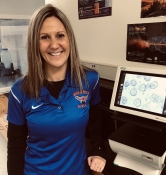
Hoffman Estates High School, Hoffman Estates, IL
For the past seventeen years, I have been a biology teacher at Hoffman Estates High School. I have taught every level of biology that our school offers - from special education co-taught biology to AP biology along with being a certified dual-credit biology instructor with William Rainey Harper College.
Throughout the years I have come to truly understand not only the needs of students at all levels but also how to build a biology program that is comprehensive in nature over an entire high-school experience. Biology is everywhere and it is my goal to teach students to be resourceful and think critically about the world around them. My philosophy is simple, I want my students to do science and love it. Lab days in my classroom are organized chaos. Students are talking, the music is rockin’ and I am running around creeping on their conversations. I want to be invisible and allow students to capitalize on “student talk” and be their own teachers.
Before teaching I earned my bachelor’s degree in Microbiology from the University of Illinois in Urbana-Champaign and later held a research assistant position at Loyola University Medical Center in the Neuroscience and Pharmacology Departments. Since 2017 I have proudly worked with the Baxter Center for Science Education, which is an OCEP program run out of Northwestern funded by Baxter International, Inc. It provides resources to teachers at no cost to run biotechnology labs in their classroom. I have also worked alongside the education team at BioRad Laboratories developing biotechnology strands for teachers at the high school level.
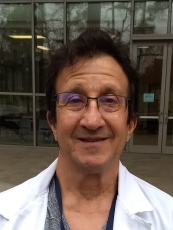
Lone Star College - Kingwood, Kingwood, TX
Dr. Shmaefsky is a professor of environmental science and IRB Chair at Lone Star College – Kingwood, near Houston, Texas. Environmental science is his primary teaching responsibility, although he does occasionally teach general biology and anatomy & physiology. Dr. Shmaefsky did his initial graduate studies in environmental physiology using fungi and then plants as research models. Several years later he pursued an Ed.D in science education to focus his efforts on science teaching. He worked as a biochemist for Sigma-Aldrich chemical company in Missouri before pursuing full-time college teaching at Southern Illinois University- Edwardsville, Northwestern Oklahoma State University, and Lone Star College. Aside from teaching college students, Dr. Shmaefsky has a passion for educating the public about biological science and environmental justice topics. He has authored several human disease books for a general readership series called Deadly Diseases and Epidemics into addition to writing chapters in technical books on phytoremediation. Dr. Shmaefsky has also given many science presentations for civic groups, policymakers, schools, and senior centers. Dr. Shmaefsky has shifted his professional research efforts to developing best practices in college science teaching.
I truly enjoy being in a two-year college setting teaching a discipline that many students find esoteric and challenging. Like many of my students, I was a first-generation college student from an underrepresented community and was working to pay for college. I focus my teaching on using active learning strategies, content relevancy, place-based learning, and DEI to engage a broad audience of students in the course content. My students learn how the data collected by environmental scientists can be used for public good. They also learn that jobs in environmental science are accessible through a variety of career options. My students design and conduct civic engagement projects and community-based research studies to help communities that are exposed to environmental justice and public health inequities. I want my students to be advocates for science and not just memorizers of science content. My role as a Professional Development Fellow for my college permits me to share best practices in 2-year college teaching with colleagues at my college and at professional organization conferences.

The National Association of Biology Teachers empowers educators to provide the best possible biology and life science education for all students.
NABT, P.O. Box 335, Heber City, UT 84032
office@nabt.org | Fax: (202) 962-3939
(888) 501-NABT or (703) 264-9696
Thank you for visiting the NABT website.
Our privacy policy is found here.
Announcements for products or services on this website do not imply endorsement of or by NABT.
Website by Morweb.org
Copyright National Association of Biology Teachers
